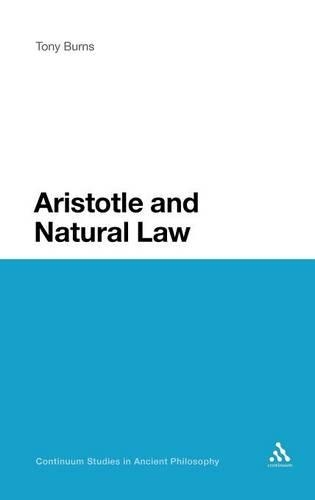
Aristotle and Natural Law
(Hardback)
Available Formats
Publishing Details
Aristotle and Natural Law
By (Author) Dr Tony Burns
Bloomsbury Publishing PLC
Continuum International Publishing Group Ltd.
27th October 2011
United Kingdom
Classifications
Professional and Scholarly
Non Fiction
Social and political philosophy
185
Physical Properties
Hardback
224
Width 156mm, Height 234mm
484g
Description
Aristotle and Natural Law lays out a new theoretical approach which distinguishes between the notions of interpretation,' appropriation,' negotiation' and reconstruction' of the meaning of texts and their component concepts. These categories are then deployed in an examination of the role which the concept of natural law is used by Aristotle in a number of key texts. The book argues that Aristotle appropriated the concept of natural law, first formulated by the defenders of naturalism in the nature versus convention debate' in classical Athens. Thereby he contributed to the emergence and historical evolution of the meaning of one of the most important concept in the lexicon of Western political thought. Aristotle and Natural Law argues that Aristotle's ethics is best seen as a certain type of natural law theory which does not allow for the possibility that individuals might appeal to natural law in order to criticize existing laws and institutions. Rather its function is to provide them with a philosophical justification from the standpoint of Aristotle's metaphysics.
Author Bio
Tony Burns is Associate Professor of Politics at the University of Nottingham, UK. He is the author of Political Theory and Science Fiction: Ursula K. Le Guin and The Dispossessed (Lexington, 2008) and Natural Law and Political Ideology in the Philosophy of Hegel (Avebury, 1996). He is co-editor, with Ian Fraser, of The Hegel-Marx Connection (Palgrave, 2000), and co-editor, with Simon Thompson, of Global Justice and the Politics of Recognition (Palgrave, forthcoming 2009).
